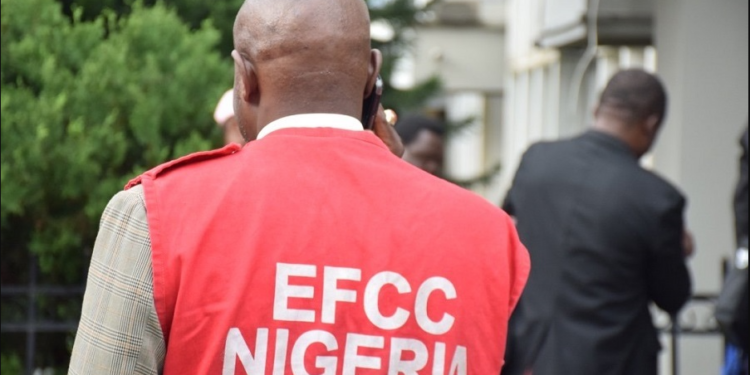Story Highlights
- Binance Ltd and its executive is facing legal scrutiny in Nigeria over money laundering and foreign exchange allegations.
- The Economic and Financial Crimes Commission (EFCC) accused Binance and Tigran Gambaryan of money laundering involving $35.4 million.
- SEC’s director testified that SEC regulations mandate oversight of platforms trading Bitcoin under Nigerian law since 2020
The Economic and Financial Crimes Commission(EFCC) on Thursday continued with its money laundering charges against cryptocurrency platform, Binance Ltd and its executive, Tigran Gambaryan, drawing reactions from the latter’s wife, Yuki.
This is coming days after Nairametrics reported that the court had last Friday discharged Gambaryan, a 39-year-old American, and fleeing Nadeem Anjarwalla from the Federal Inland Revenue Service (FIRS) tax evasion case against Binance.
The court made the decision in a short ruling following fresh amended charges filed by the FIRS, a federal government agency, in view of a notice from Binance about its appointment of a Nigerian representative by the name of Ayodele Omotilewa.
Gambaryan’s wife had urged the EFCC to release her husband like FIRS did.
But at today’s proceedings, the EFCC lead counsel, Ekele Iheanacho announced appearance, paving way for the cross-examination of its director at the Security and Exchange Commission (SEC), Abdulkadir Abbas.
Family Reacts
Gambaryan’s wife, Yuki released a statement for the press, saying she does not see why the EFCC cannot do what FIRS had done.
She called on the United States government to fast-track the release of her husband.
“It is time for the Nigerian authorities to do the right thing and let my innocent husband go.
“I am also once again calling on the US government to intervene more forcefully. Tigran’s and my own tax dollars get sent to Nigeria in aid every year. Nigeria is supposed to be an ally. I refuse to believe that our State Department cannot do more to have an innocent American citizen released,” she stated.
What transpired in court
At the resumed hearing, Abbas entered the witness box for cross examination by Binance lawyer, Babatunde Fagbohunlu(SAN) while Gambaryan was docked.
The witness maintained that a private company who wants to raise capital from the public, must become a Public Limited Company(PLC) before it can then do an IPO, adding that Binance was not even registered with SEC at the first place.
“IPO can even be done by a public company that has never issued securities to the public, not only a private company.
“Our role(in SEC) is very clear when it comes to public offer of securities or IPO; the transaction parties are clearly defined and we use issuer as the entity for creating the securities,” Abbas stressed under cross-examination.
Fagbohunlu then asked the witness a question on Bitcoin, saying “ For instance, Mrs A wants to sell some Bitcoin. Mr B wants to buy. Binance operates a platform on which Mrs A and Mr B can meet to conduct the trade.
“Upon what basis does SEC treat this kind of trade as a Securities transaction so as to bring it under SEC’s regulatory oversight?”
The witness replied that based on SEC guidelines since 2020, for “any trading of this nature (Bitcoin), the SEC “must have oversight over the platform” before Mrs A or Mr B’s transactions can be lawful.
Abbas told the court that SEC operates within the confines of the Investment Securities Act(ISA) 2007.
The ISA is a Nigerian law that regulates investment and securities business in Nigeria.
After answering the questions, the defense team asked for adjournment till tomorrow to continue their cross-examination of the SEC director.
The court earlier admitted the SEC rules on custody of digital assets as exhibits as requested by the defense team.
More insights
SEC is a Federal Government agency that carries out registration of all capital market stakeholders, instruments to be traded on the market, and all the trading platforms.
In addition, the SEC makes rules and regulations on the capital market, conducts investigations, investigates enforcement as well as monitors the market.
Abbas, who had identified himself as Director, of Exchanges and Market Infrastructure (SEC), told Justice Emeka Nwite that the Naira P2P feature deployed by Binance as well as the number of people on the platform “adversely affected the official exchange rate.”
Nairametrics reports that a popular method of buying and selling crypto is through Peer-to-peer, otherwise known as P2P.
The seller and buyer are connected in what can be likened to a marketplace.
Binance and its executives are faced with two separate suits by the FIRS and EFCC; the former bordering on tax evasion while the latter on money laundering and foreign exchange contravention.
Nairametrics recalls that the executives have also instituted a fundamental rights case against agencies of the Nigerian government, citing a violation of their constitutional right to liberty but that of Anjarwallan was struck out for lack of diligent prosecution.
On February 28, Nigerian authorities detained the two senior Binance executives.
While FIRS has dropped its charges against Gambaryan and Anjarwalla, EFCC is apparently moving on with its case as of now.
Nairametrics gathered from sources that the EFCC believes Gambaryan and Nadeem allegedly played a role in its money laundering allegations.
Meanwhile, amid the development, a number of US political stakeholders are pressing its government to compel Nigerian government to free Gambaryan.














